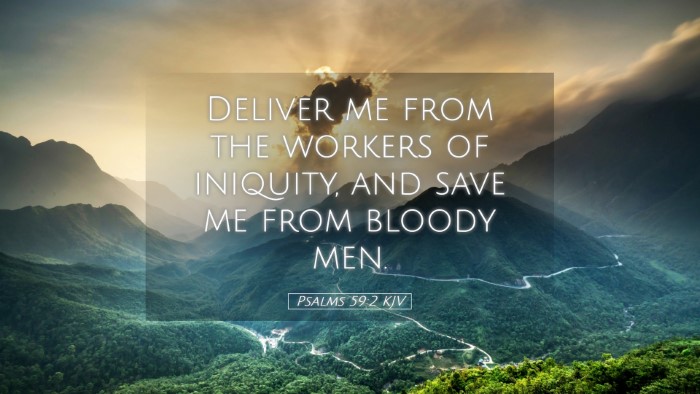Psalms 59:2 Commentary
Verse Text: "Deliver me from the workers of iniquity, and save me from bloody men."
This verse encapsulates a profound plea for divine intervention against those who perpetrate evil. It reflects the urgency in David's call for deliverance from his enemies, recognized here as "workers of iniquity" and "bloody men," emphasizing the malevolent nature of his adversaries.
Contextual Background
This plea occurs in the larger context of a Psalm attributed to David when he fled from Saul, who sought his life. It provides insight into David’s trials and the intense pressures he faced. As a leader and a man after God’s own heart, David's prayers reveal both his vulnerabilities and his profound reliance on God for protection and justice.
Insights from Public Domain Commentaries
Matthew Henry's Commentary
Henry emphasizes the personal nature of David's distress, noting that his plea is directed towards God as his ultimate deliverer. The term "workers of iniquity" signifies those who not only engage in evil but also actively seek to promote wickedness. David’s recognition of their intention as “bloody” underlines the physical threat they pose to him.
- Divine Deliverance: Henry asserts that the psalmist acknowledges that true safety and liberation come only from God. The term "deliver" suggests a forceful removal from danger, reiterating David's reliance on divine power amidst human threats.
- Nature of the Enemies: The description of enemies as "bloody men" portrays them as violent and ruthless, emphasizing the urgency of David’s request. This highlights the reality of spiritual battles where divine intervention is crucial.
Albert Barnes' Notes
Barnes offers a detailed explanation of the terms used in this verse. He notes that the phrase "workers of iniquity" can refer not just to individual transgressors, but to a collective group characterized by their broader immoral agenda. He underlines that David appeals for both deliverance and salvation, specifying that his plight is not just physical but also spiritual, indicating a deeper reliance on God's saving grace.
- Spiritual Application: Barnes suggests that this verse serves as a reminder for believers today to seek God in the face of adversity. The context remains relevant for modern-day followers who may find themselves persecuted or surrounded by moral decay.
- Call for Justice: He articulates that David’s cry is not merely for personal safety but also for the establishment of justice against evildoers. This aspect resonates with the biblical theme of righteous judgment and God's response to human wickedness.
Adam Clarke's Commentary
Clarke takes a linguistic approach, discussing the original Hebrew terms and their implications. He points out that the term for "deliver" includes the connotation of being snatched away from danger. Furthermore, Clarke notes the use of the phrase "bloody men" highlights the violent and premeditated nature of the threats against David, suggesting a background of betrayal and relentless pursuit.
- Importance of Context: Clarke argues that understanding the historical context of this Psalm—David’s flight from Saul—enhances the interpretation of David’s anguish and desperation for God’s intervention.
- Theological Reflection: Clarke encourages a contemplation of God's attributes in this Psalm: His role as protector, savior, and avenger of the righteous. This theological framework prompts readers to reflect on their trust in divine sovereignty amidst trials.
Theological Implications
The plea for deliverance in Psalms 59:2 serves as a significant theological reflection on the nature of evil and the believer’s response to it. It underscores the persistent presence of evil against which believers are called to stand firm in faith, firmly rooted in the belief of God's eventual deliverance.
- Faith in Adversity: This verse reminds the faithful that, during challenging times, their focus should remain on God’s power to save and protect, rather than succumbing to despair.
- Collective Struggle: The mention of "workers of iniquity" alludes to a collective effort against righteousness. This can invites a reflection on social justice and the importance of standing against systemic evil.
Conclusion
Psalms 59:2 portrays a heartfelt cry for deliverance that resonates with believers across generations. The insights drawn from the public domain commentaries of Matthew Henry, Albert Barnes, and Adam Clarke offer layered understanding from historical, spiritual, and theological perspectives. As pastors, students, and scholars reflect on this verse, it serves as an enduring reminder of reliance on God amidst adversity and the persistent hope for justice against evil.


